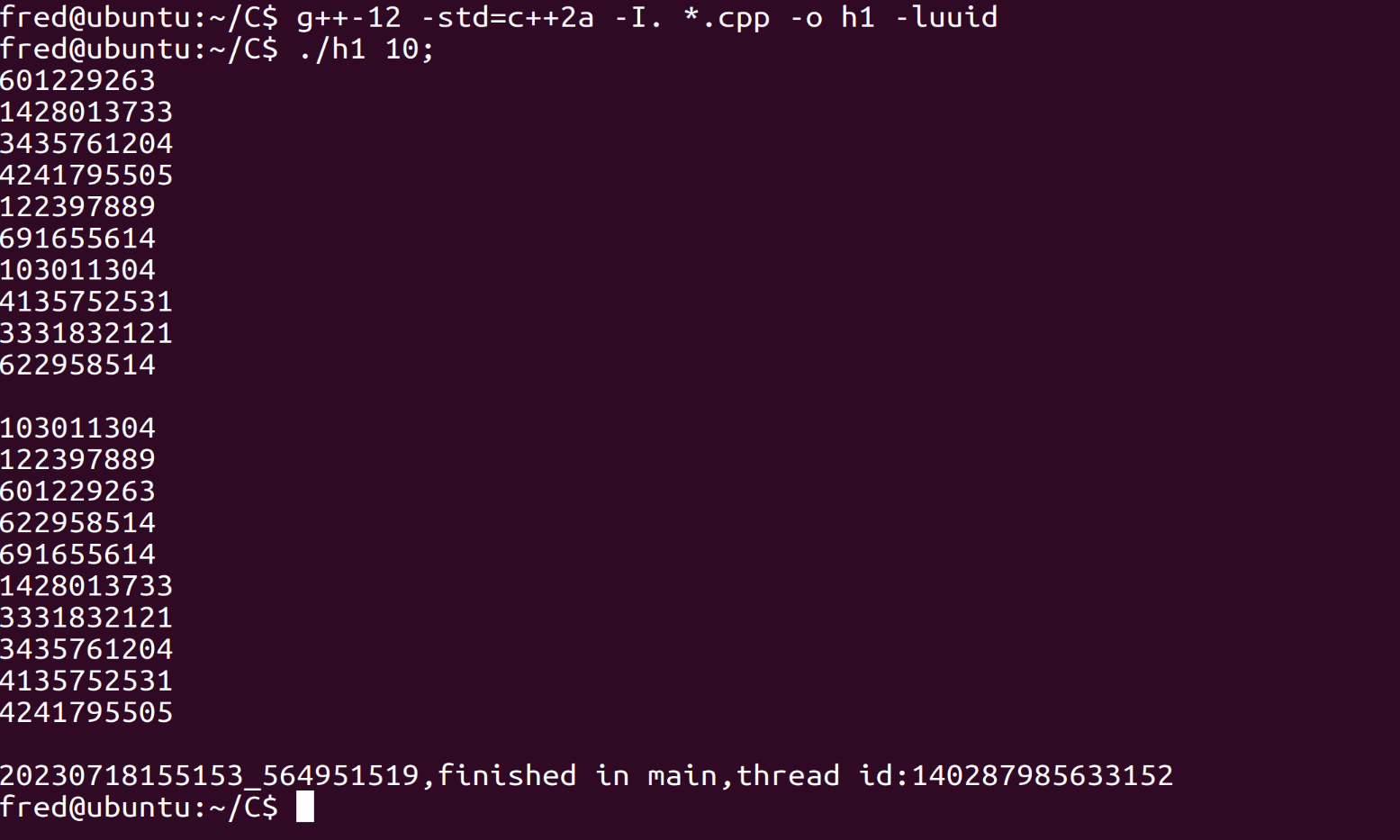cpp generate random array and then quick sort
1 2 3 4 5 6 7 8 9 10 11 12 13 14 15 16 17 18 19 20 21 22 23 24 25 26 27 28 29 30 31 32 33 34 35 36 37 38 39 40 41 42 43 44 45 46 47 48 49 50 51 52 53 54 55 56 57 58 59 60 61 62 63 64 65 66 67 68 69 70 71 72 73 74 75 76 77 78 79 80 81 82 83 84 85 86 87 88 89 90 91 92 93 94 95 96 97 98 99 100 101 102 103 104 105 106 107 108 109 110 111 112 113 114 115 116 117 118 119 120 121 122 123 124 125 126 127 128 | #include <algorithm>#include <chrono>#include <ctime>#include <fstream>#include <iomanip>#include <iostream>#include <random>#include <sstream>#include <thread>#include <uuid/uuid.h>#include <vector>std::string get_time_now(){ std::chrono::time_point<std::chrono::high_resolution_clock> now = std::chrono::high_resolution_clock::now(); time_t raw_time = std::chrono::high_resolution_clock::to_time_t(now); tm tm_info = *localtime(&raw_time); std::stringstream ss; ss << std::put_time(&tm_info, "%Y%m%d%H%M%S"); auto seconds = std::chrono::duration_cast<std::chrono::seconds>(now.time_since_epoch()); auto mills = std::chrono::duration_cast<std::chrono::milliseconds>(now.time_since_epoch()); auto micros = std::chrono::duration_cast<std::chrono::microseconds>(now.time_since_epoch()); auto nanos = std::chrono::duration_cast<std::chrono::nanoseconds>(now.time_since_epoch()); ss << "_" << std::setw(3) << std::setfill('0') << (mills.count() - seconds.count() * 1000) << std::setw(3) << std::setfill('0') << (micros.count() - mills.count() * 1000) << std::setw(3) << std::setfill('0') << (nanos.count() - micros.count() * 1000); return ss.str();}std::random_device rd;std::mt19937_64 _mt{rd()};template <typename T>T gen_rand(T min, T max){ std::uniform_int_distribution<T> _uid(min, max); return _uid(_mt);}template <typename T>void gen_rand_array(T *arr, T min, T max, const int &len){ for (int i = 0; i < len; i++) { arr[i] = gen_rand<T>(min, max); }}template <typename T>void print_t_array(T *arr, const int &len){ for (int i = 0; i < len; i++) { std::cout << arr[i] << std::endl; } std::cout << std::endl;}template <typename T>void gen_print_rand_array(T min, T max, const int &len){ T *arr = new T[len]; gen_rand_array(arr, min, max, std::cref(len)); print_t_array(arr, std::cref(len)); delete[] arr; std::cout << get_time_now() << ",finish in " << __FUNCTION__ << std::endl;}template <typename T>void swap(T *t1, T *t2){ if (t1 == t2) { return; } T temp = *t1; *t1 = *t2; *t2 = temp;}template <typename T>int partition(T *arr, int low, int high){ T pivot = arr[high]; int i = low - 1; for (int j = low; j <= high; j++) { if (arr[j] < pivot) { i = i + 1; swap(&arr[i], &arr[j]); } } swap(&arr[i + 1], &arr[high]); return i + 1;}template <typename T>void quick_sort_t(T *arr, int low, int high){ if (low < high) { int pivot = partition(arr, low, high); quick_sort_t(arr, low, pivot - 1); quick_sort_t(arr, pivot + 1, high); }}template <typename T>void gen_print_quick_sort_t_array(T min, T max, const int &len){ T *arr = new T[len]; gen_rand_array(arr, min, max, std::cref(len)); print_t_array(arr, std::cref(len)); // std::cout << "\nAfter quick sort:" << std::endl; quick_sort_t(arr, 0, len - 1); print_t_array(arr, std::cref(len)); delete[] arr; // std::cout << get_time_now() << ",thread id:" << std::this_thread::get_id() << ",finish in " << __FUNCTION__ << std::endl;}int main(int args, char **argv){ gen_print_quick_sort_t_array<std::uint32_t>(0, UINT32_MAX, atoi(argv[1])); std::cout << get_time_now() << ",finished in " << __FUNCTION__ << ",thread id:" << std::this_thread::get_id() << std::endl;} |
Compile
1 | g++-12 -std=c++2a -I. *.cpp -o h1 -luuid |






【推荐】国内首个AI IDE,深度理解中文开发场景,立即下载体验Trae
【推荐】编程新体验,更懂你的AI,立即体验豆包MarsCode编程助手
【推荐】抖音旗下AI助手豆包,你的智能百科全书,全免费不限次数
【推荐】轻量又高性能的 SSH 工具 IShell:AI 加持,快人一步
· 分享一个免费、快速、无限量使用的满血 DeepSeek R1 模型,支持深度思考和联网搜索!
· 基于 Docker 搭建 FRP 内网穿透开源项目(很简单哒)
· ollama系列01:轻松3步本地部署deepseek,普通电脑可用
· 25岁的心里话
· 按钮权限的设计及实现